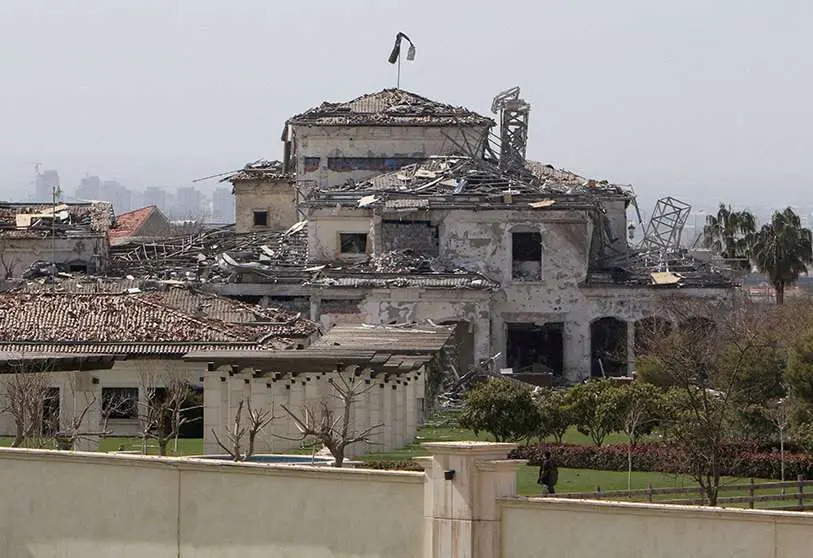Kurdish gas trade, the B-side of Iran's bombing of Erbil

On 13 March, after almost two years without direct attacks between Tehran and Washington, the Iranian Islamic Revolutionary Guard (IRGC) claimed to have launched a dozen missiles that could put an end to the truce. The offensive was carried out with "twelve ballistic missiles fired at a neighbourhood in Erbil [capital of the Kurdistan Autonomous Region] and aimed at the US consulate", the Kurdish anti-terrorist unit denounced the attack, which resulted in two injuries and numerous material damages.
The Persian authorities rejected these accusations, pointing out that the bombing was not aimed at US diplomatic facilities - which were not yet staffed - but at a "strategic centre of Zionist conspiracies" of the Israeli intelligence agency, Mossad. It was a response to attacks carried out by Tel Aviv on Syrian territory, where four people were killed, including two members of the Revolutionary Guards.

However, recent statements by Turkish, Iraqi and US officials - on condition of anonymity - to the Reuters news agency have shed light on the possibility that Iranian interests in the attack went beyond revenge and a show of force on Iraqi soil.
During the bombing, one of the most heavily damaged sites were the villas of Baz Karim Al-Barzanji, a Kurdish energy businessman who owns the Kar Oil Group company and is reportedly working on the development of a pipeline to export natural gas to the rest of Iraq, Europe and Turkey. In fact, most of the missiles hit this particular location. According to Iraqi officials, 'there were two recent meetings between Israeli and US officials and energy specialists in the village to discuss sending gas from Kurdistan to Turkey via a new pipeline'.

A situation that would have raised Tehran's alarm, as its plans to export gas to Iraq and Turkey would be seriously threatened by gas production in Iraqi Kurdistan. And, to make matters worse, all this in the midst of negotiations to try to revive the 2015 Nuclear Pact, which have yet to bear fruit, and international sanctions, which continue to extort the Persian economy.
Moreover, the risk of imminent energy shortages in Europe - caused by sanctions against Russian oil and gas - has brought the historically antagonistic Israel and Turkey closer together. In recent years, the two powers have sought greater cooperation on energy issues, as evidenced by Erdogan's statement last month that Ankara and Tel Aviv could work together to transport Israeli gas to Europe.

"The timing of the attack in Erbil is very interesting," Turkish officials explained to Reuters. "It seems it was more aimed at northern Iraq's energy exports and possible cooperation that would include Israel," than at reasserting its power in the territory and directly challenging Washington. In general terms, all officials agreed that the attack sent a multiple message to all US allies in the region.
Businessman Baz Karim Al-Barzanji's Kar Oil Group manages - together with Russia's Rosneft - a third of one of the main domestic pipelines in the region. And, according to US sources, Al-Barzanji is reportedly fast-tracking a pipeline project that will connect to an already completed line on the Turkish side of the border.
"Talks were held for natural gas exports from northern Iraq and we know that Iraq, the US and Israel were involved in the process," said one of the Ottoman officials. "And Turkey supports this."

However, the office of Nechirvan Barzani, president of the Kurdistan Autonomous Region, has denied that such meetings with US and Israeli representatives have taken place, denying that they are even in the territory. But international analysts do not discount the veracity of the statements, arguing that this stance could be motivated by fear of the political consequences for the Shia Sadrist Bloc and the Sunni Sovereign Alliance - both opposed to rapprochement with Washington - in the midst of elections for a new president.
In the same vein, statements by Iraqi Kurdistan Prime Minister Masrour Bargzani on Monday would support Erbil's interest in offsetting some of the energy shortages now facing Europe. Specifically in the oil sector. "We in Kurdistan now have the ability to make up at least part of the oil deficit in Europe, if our partners in Baghdad are willing to work with us," Bargzani posted on his official Twitter account.

On gas exports, the prime minister said that northern Iraq could become "a net exporter of gas to the rest of Iraq, Turkey and Europe in the near future". Kurdistan "will soon become an important source of energy and will contribute to meeting global demand", he added.
Masrour Bargzani also noted that the region produces and exports about half a million barrels of crude oil daily, and another 500 million cubic metres of natural gas, and has "the potential to grow both".








